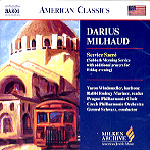Along with Ernest Bloch’s Sacred Service, Milhaud’s Service Sacré is one of the relatively rare major works of Jewish liturgy that are as amenable to the concert hall as to the synagogue. Both were commissioned by San Francisco’s Temple Emanuel-El and its cantor, Reuben Rinder; both utilize a baritone soloist, large chorus, and orchestra; and both were written by European-born American composers acutely aware of their Jewish heritage. The Bloch, written in 1930, has long been recognized as an important work, and this recording should help call attention to Milhaud’s achievement as well.
The text is the Sabbath morning service as laid out in the Union Prayer Book of the American Reform movement. Naxos appends to the 1947 score the five settings of texts used in the more frequented Friday night services later added by the composer. Milhaud also includes passages for a reciter reading prayers in English, accompanied by beautifully scored orchestral backgrounds. Milhaud tailored the vocal solo and choral settings to the Ashkenazi pronunciation of Hebrew then prevalent in American synagogues, but he preferred the pronunciation familiar to him from his native Provence, which was closer to the Sephardi. The booklet says that Sephardi pronunication is used in this recording; Hebrew speakers will recognize it as contemporary Israeli spoken Hebrew, flawlessly handled by the Czech chorus and Israeli baritone soloist.
Written in the shadow of the Holocaust, which claimed more than 20 of his cousins, Milhaud’s Service Sacré is a personal affirmation of faith and a universal expression of serenity, joy, and longing for peace. The music often alternates between the lyric and the declamatory, sometimes turning on a dime. The baritone solos, well sung by Yaron Windmueller, tend to brevity and often lead into or out of choral passages, as in the Bar’khu’s declamatory, timpani-punctuated praise to the Lord. Americanisms abound–as in the snare drum-accompanied chorale Mi Khamokha and in the Copland/Harris horizons of K’dusha, whose repeated cymbal crashes add to the joyous closing Hallelujahs.
There are tonal allusions to the medieval as well as to the modern, and Milhaud’s beloved Provencal melodies surface throughout the score. Time and again, there’s a melodic fragment or an orchestral passage that rivets our interest, such as the tenderly hushed strings and the muted trumpets in the Kaddish. Gerard Schwarz leads the Czech Philharmonic with energy and lends the lyric sections the tenderness they need. If the recording lacks the last word in transparency, it is more than adequate to convey Milhaud’s vision. Naxos provides English texts and translations, but a transliterated version of the Hebrew original would have been welcome.
































